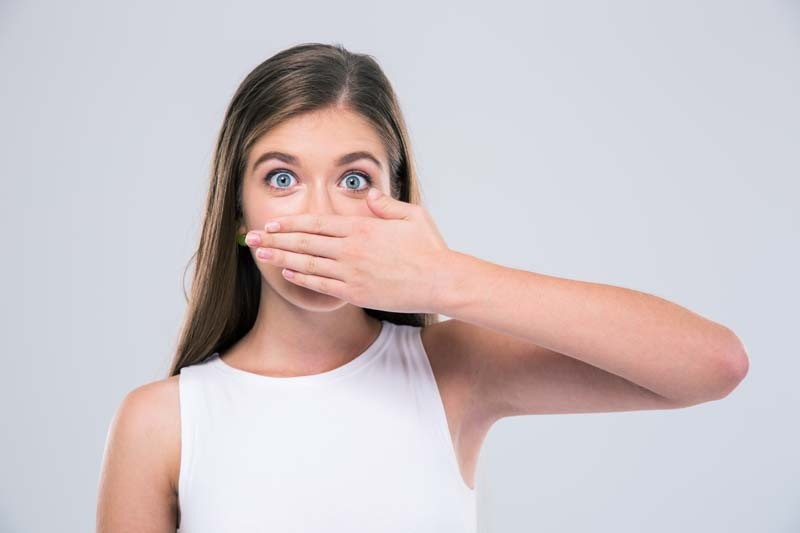It's an expression we've heard many times before: Open mouth, insert foot. Unfortunately for some people, every time they open their mouth, it smells like a stinky foot has been there (with sock removed), even when it hasn't. This is what's known as bad breath—the clinical term is halitosis, and it's been estimated that 25 to 30 percent of people have it. Much of the time, bad breath is temporary, the result of eating a meal consisting of a spicy food carrying a particularly strong odor. It could be a spiced-up pizza laced with garlic and/or onions, or perhaps even just drinking a can of hot, spicy tomato juice that when breathed back out can make eyes water 10 feet away. For someone with persistent bad breath, i.e. halitosis, one of the most common causes is sloppy dental hygiene, characterized by poor or—pinch your nose—nonexistent brushing, flossing and rinsing habits. If you don't brush and floss teeth daily (dentists recommend at least twice a day), food particles can get lodged in your mouth, such as between teeth, around the gums and on the tongue. Those particles can collectively act as an incubator for bacteria, which in turn can lead to bad breath of the lingering sort. Scented mouthwash or breath mints only mask the condition, not eradicate it. Antibacterial mouth rinses can help reduce bacteria, but on their own they are not a true problem solver, especially when dealing with gum disease or tooth decay. Keep in mind, too, that eating a spicy, pungent food, chewing it and then swallowing it doesn't make the bad breath disappear. It will come back around. According to mayoclinic.org, After you digest these foods, they enter your bloodstream, are carried to your lungs and affect your breath. Other possible dental-related causes of bad breath, according to webmd.com, include cavities, poorly-fitted dental appliances such as dentures or braces, and yeast infections. There's also a medical condition known as xerostomia (dry mouth), that can lead to stinky breath. Saliva isn't there just so we can drool; it moistens the mouth such that plaque-producing acids can be neutralized and dead cells accumulating inside the mouth can be washed away.
Some Quick Suggestions for Dealing With Bad Breath
If you have bad breath and want to get rid of it, or if you don't have it but want to guard against it, here are some practical suggestions:- Practice good dental hygiene—brushing, flossing and rinsing—and stick to it every day. This includes brushing your tongue, as well as your teeth and gums. In fact, everydayhealth.com recommends scraping your tongue with a tongue scraper or spoon. Hold the tip of your tongue with gauze so you can get to the back of your tongue for cleaning.
- Replace your toothbrush every few months, even if the bristles are holding up well and the brush looks clean. Remember, this is about bacteria, those microscopic things you can't see with the naked eye.
- Chewing on cloves, or any of these other 11 foods and drinks that can help kill halitosis-causing bacteria or at least neutralize mouth odors. Eating fruits such as oranges or lemons can boost the production of that health-protecting saliva we talked about as well as give your breath a nice shot of freshness.
- Do you smoke, chew tobacco or drink alcohol? OK, we're not here to self-righteously tell you to stop doing those things, but be forewarned: all those activities can contribute to bad breath in a big-time way. Hey, it's your breath, sure, but your breath can encroach on someone else's olfactory senses. Be considerate.
- Drink lots of water. This isn't good only if you want to lose weight—it helps keep your mouth moist. So does sugarless gum and sugarless mints.
- If you suspect you have halitosis, go see your dentist to be examined and answer his or her questions so they can help identify the root cause: it could end up being a more serious health issue such as a respiratory tract infection, diabetes, kidney or liver problems, or chronic acid reflux.

